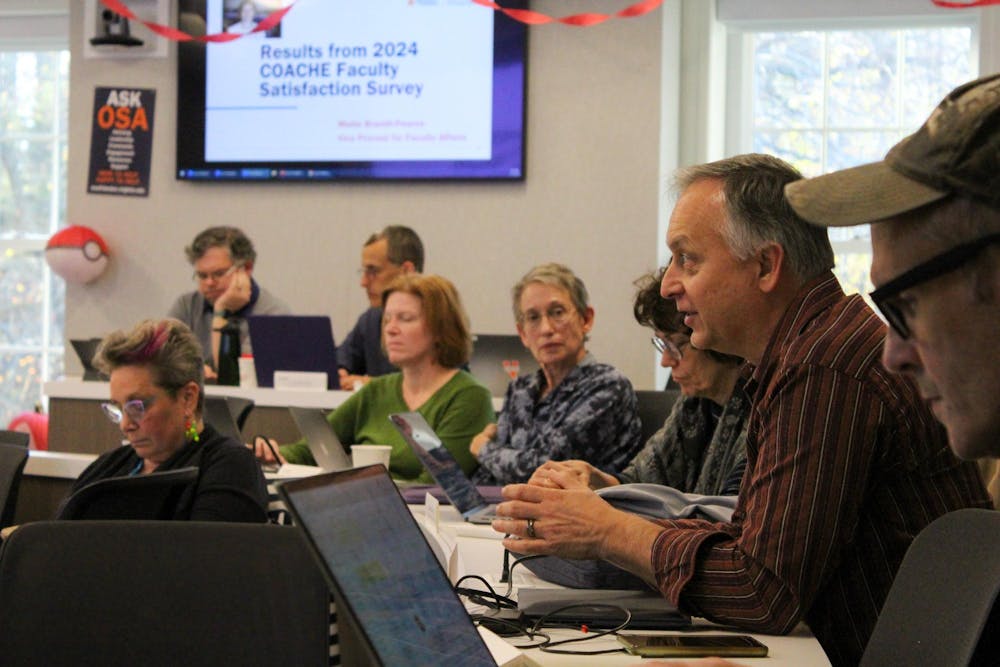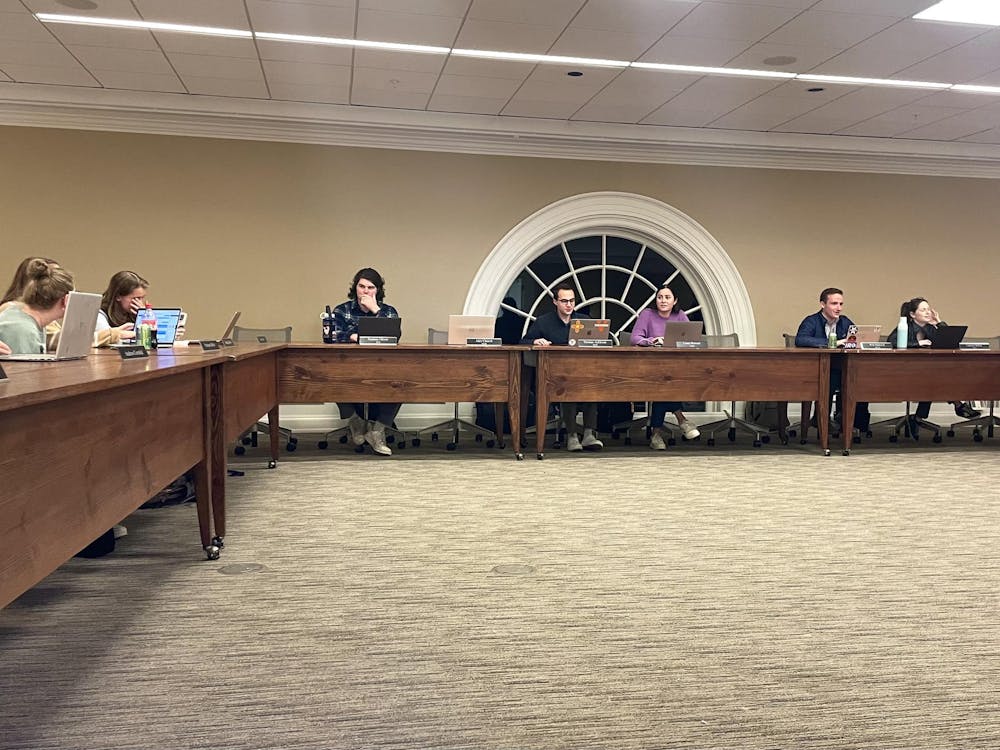The Faculty Senate discussed the future of athletics at the University in light of NCAA reforms changing athlete payment rules, as well as how anticipated changes to higher education-related federal policies under the incoming Trump administration could impact the University, at their meeting Friday. The packed agenda also included updates on ongoing investigations into allegations of administrative misconduct in the School of Medicine and events related to the May 4 police clearing of a pro-Palestine encampment on Grounds, as well as University advancements in artificial intelligence and other research.
A significant portion of the meeting centered on the future of college athletics, shaped by a historic $2.78 billion antitrust settlement in the House v. NCAA case. The settlement ended the NCAA’s long standing model of amateurism, which required that student athletes be unpaid in order to be eligible to participate in the NCAA. Schools in the NCAA, including those in the Power Five conferences — five major Division I athletic conferences in the NCAA — have committed to the $2.78 billion settlement to compensate student-athletes who were barred from receiving payment under the previous rules. Under the new structure, schools, including the University, will be allowed to pay athletes directly for playing for their teams.
University President Jim Ryan outlined the potential impact of these reforms by explaining key changes that he said the University’s athletics division is considering. According to Ryan, these reforms give the University the option to share a portion of their revenue with student-athletes, potentially amounting to around $20 million paid to University athletes annually.
One such change, according to Ryan, is that the current scholarship cap system — in which each team can only award up to a certain number of scholarships for their athletes, with that limit being different for each team — could shift to a roster limits system. The new roster limits would instead limit the number of total players permitted on a team, potentially allowing the University to offer full scholarships to an entire team of athletes.
Ryan also said that third-party Name, Image and Likeness payments — in which a brand or company pays student athletes to use their image or likeness for promotional purposes — would continue at the University but with stricter regulations.
In light of these possible changes, members of the Faculty Senate raised concerns about the equitable implementation of these changes in relation to Title IX, which mandates gender equity in college sports. Faculty highlighted that revenue-sharing models might disproportionately favor high-revenue sports like men’s football and basketball, and create challenges for women’s athletics and smaller programs.
President Ryan reassured the Senate that the University will strive to remain competitive in sports, but he also acknowledged the increasing costs of maintaining a competitive athletic program and recognized that “hard decisions” may need to be made in the future. Faculty questioned whether certain sports could see the sizes of their teams reduced under the new financial structure. Ryan mentioned strategies such as utilizing philanthropy and fundraising campaigns to help navigate these challenges while preserving the University’s academic mission.
“Right now, it's so cloudy that it doesn't make sense to me to just throw in the towel and say we're going to no longer try to compete at the highest level in all the sports that we compete in,” Ryan said. “But there may come a time where we have no other choice than to make hard decisions about what we're going to do in college athletics.”
In addition to athletics, the Senate discussed the potential challenges posed by anticipated federal policy changes under the incoming Trump administration. Ryan acknowledged uncertainty surrounding some potential changes, such as restrictions on visas for international students and faculty, research funding priorities and potential tax changes affecting University endowments. According to Ryan, while many of these changes remain speculative, administrators are developing contingency plans to prepare for a range of scenarios.
“It’s a little bit hard to plan, obviously, because you don’t know what [policies are] going to be translated from the campaign to governing,” Ryan said. “What we are trying to do is assess the likelihood and the mechanisms by which [the anticipated changes] would occur … so thinking about what can be done by executive order, what requires congressional approval [and] what would happen in the regulatory sphere, and then thinking about how [we can] either prepare or respond.”
Ryan also confirmed the timeline for the review of events surrounding the May 4 police clearing of a pro-Palestine encampment on Grounds, having previously informed the Senate at their Oct. 18 meeting that a review would be conducted but not providing further details. He said that the review will be a topic of discussion for the Board of Visitors during their December meeting.
Ryan also invited faculty feedback on a statement by the Committee on Institutional Statements which recommends that the University should not weigh in on political or social issues unrelated to the mission or the values of the school. He referenced principles from the Kalven Report, a foundational document from 1967 that laid out guidelines on when a university should make political pronouncements.
Ryan stated that maintaining neutrality does not mean staying silent, adding that the University can still express empathy and direct individuals to mental health resources or academic resources during significant societal events without advocating for specific positions.
“If something cataclysmic happens in the world and there’s complete silence, it can feel jarring, as though we’re going out of our way to avoid responding,” Ryan said. “And so the statement emphasizes that there's nothing wrong with expressing empathy, and there's nothing wrong with directing students to resources that they want to learn more about.”
The Senate also received a brief update on the ongoing investigation within the School of Medicine, which began after a group of U.Va. Physicians Group-employed faculty sent a letter of no confidence to the Board calling for the removal of Melina Kibbe, dean of the School of Medicine, Medicine professor and chief health affairs officer, and Craig Kent, chief executive officer of U.Va. Health. In the letter, faculty alleged that Kibbe and Kent had jeopardized patient safety by suppressing reports of misconduct and subjecting residents who raised concerns about patient safety to harassment.
Michael Kennedy, Faculty Senate representative to the Board of Visitors, stated that allegations involving the U.Va. Physicians Group remain under review by independent legal counsel. In addition, Kennedy acknowledged frustrations over the investigation’s length but assured members that the extra time will help ensure that the review will be thorough and comprehensive.
Provost Ian Baucom turned the meeting’s focus to the University’s advancements in artificial intelligence research. According to Baucom, a faculty advisory group has been working over the past year to coordinate AI-related efforts across multiple schools, including Darden, Engineering and Applied Sciences and Data Science. Baucom said that the administration is having early conversations about plans for a Commonwealth AI Institute in partnership with Virginia Tech and other state institutions, which would promote ethical AI development and workforce training.
Baucom also shared plans for a $100 million gift supporting the creation of an institute at Darden to explore ethical AI practice in business. In addition, he shared that ongoing work at the Karsh Institute of Democracy focuses on implications for AI in democratic institutions, such as voting security and public trust.
During the meeting, Baucom also said the University would continue to work to improve research at the University, including by addressing inefficiencies in the Office of Sponsored Programs and the Institutional Review Board for the Social and Behavioral Sciences, which are involved in managing funding for research projects at the University and reviewing behavioral research at the University, respectively. According to Baucom, the administration is working to streamline processes, improve communication and enhance grant-related support.
The Faculty Senate will reconvene Dec. 13.
CORRECTION: A previous version of this article incorrectly stated that the results of the May 4 review would be discussed at the December Board of Visitors meeting and shared with the Faculty Senate shortly thereafter. The results of the review will not be discussed at the Board meeting, but instead the review will be a talking point, as the results will not yet be available. The article has been updated to reflect this change.





